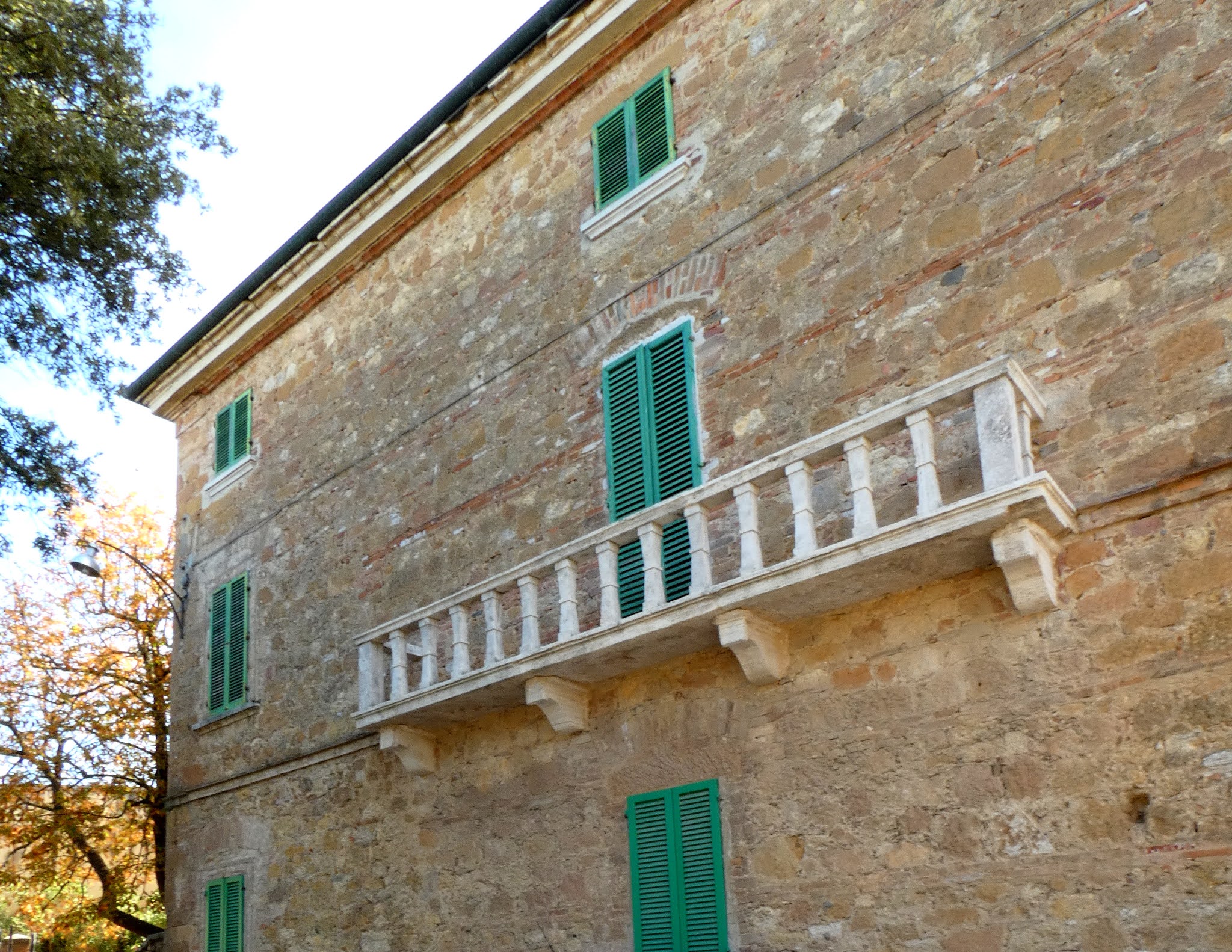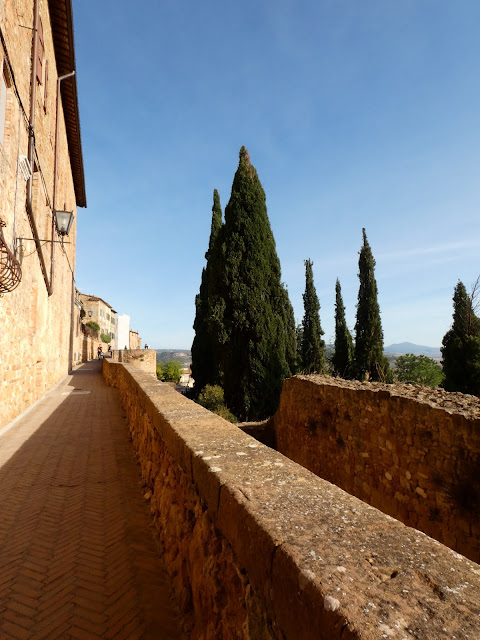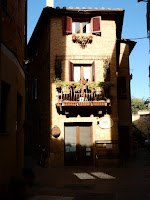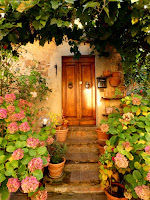I knew I was going to love Pienza the moment I set foot out of the car and we took the scenic walk into the old city, which was just five minutes away.
The first thing we came across was a convent with the most beautiful view I have ever laid eyes on. It was a warm autumn day and the nuns were selling their produce in their enormous garden under a cluster of cheerful beach umbrellas.
Then, a little old lady walked past with a small bunch of flowers in her hand (a la` Under The Tuscan Sun). She was headed towards the Church of Santa Caterina and I wondered whether the flowers were for a departed loved one or to place in front of the niche of a favourite saint. I hoped it was the latter.
And just before we crossed the street to enter the historical centre, I spied the house of my dreams. And it was for sale. I think I must have sighed out loud with longing but I'm not Frances Mayes and taking such a huge leap into the unknown is not really consistent with my character.
Anyhow, I'll continue to dream but, for the moment, let's take a short stroll around Pienza.
A short history of Pienza
Pienza, or Corsignano as it was originally named, dates back to the 9th century. In 1300 parts of the village became property of the Piccolomini family. Enea Silvio Piccolomini was born in Corsignano in 1405. After a long period of Humanist studies he had a successful career as a diplomat and politician. After a short stint as Archbishop of Siena, he was elected pope in 1458. Now known as Pius II he made plans to rebuild the village of his birth as an ideal Renaissance town and named it Pienza (the town of Pius).
Pienza's landmarks
The most important sights of Pienza are all located on its main square, Piazza Pio II. These are the Cattedrale di Santa Maria Assunta with its Germanic-inspired tower, Palazzo Piccolomini, Palazzo Comunale and Palazzo Vescovile. The latter was built by the notorious Cardinal Rodrigo Borgia who later became Pope Alexander VI and it now houses the Diocesan Museum.
Cattedrale di Santa Maria Assunta
Pienza's claims to fame
In 1996 Pienza was designated a UNESCO World Heritage Site as it represents the first application of the Renaissance Humanist concept of urban design and it played a major role in subsequent urban development in Italy and beyond.
Pienza is also famous for its pecorino cheese and a festival is held in the town every first Sunday of September to celebrate this world-famous cheese that I happen to love so much. There are several shops selling Pecorino cheese in Pienza and I was sorely tempted to buy a whole round of it but decided that even I might have some difficulty eating all that cheese.
This pretty town was chosen by director Franco Zeffirelli to film the hauntingly beautiful 1968 version of Romeo and Juliet, starring a very young Olivia Hussey as Juliet and Leonard Whiting as Romeo. If you've seen the movie you might recognise the well below (Pozzo dei Cani).
What I loved about Pienza
Pienza ia very compact and it doesn't take very long to see the whole town (unless you're prone to stopping every 5 seconds to take photos). Like most hilltop towns in Tuscany, Pienza's streets are narrow and winding, flanked on both sides by pretty, well-kept buildings that are 2 or 3 storeys high.
In contrast to some other places we visited, Pienza is relatively flat, making walking easier as there are no steep hills to navigate. A number of its streets lead towards the walls from where the magnificent colours of the Val d'Orcia assault your senses like a fireworks display on the 4th of July. It's the type of view that I could have stared at for hours on end but which I eventually had to leave to continue exploring this pretty town.
Since the buildings in Pienza are not very high the whole town feels light and airy as it doesn't seem to be weighed down by too much stone. Many houses are very prettily decorated with pots of flowers and, although there were some visitors (like us) roaming around, the place was not crowded at all. It also has some very romantically named streets like Via dell'Amore (Love Street) and Via del Bacio (Kiss Street) that I thought was really sweet and made me wonder whether the residents live some type of enchanted life.
I really felt at home in Pienza (although I rarely feel out of place in Italy) and would have loved to spend more time there even though we saw most of the town in the time that we had. Being there just felt right somehow and I know that I've placed it on my list of places to revisit.
It is probably difficult to describe Pienza's attraction to someone who is looking for flamboyant architecture or world-known attractions but what I love most about it is its simplicity coupled with gorgeous Renaissance architecture, charming dwellings, its proximity to wide open spaces and the surrounding landscape of the Val d'Orcia that is more stunning than anything I could ever have imagined.
More about Pienza:



































Your photos are very beautiful, shows exactly how nice this place is ! I wished I would live in the "Via del Bacio !! (with or withoug mask ? )
ReplyDeleteGreat photos of a lovely town!
ReplyDeleteI like the names given to streets such as: Love street, Kiss street.
Loree this looks like a gorgeous place to visit. The narrow streets and the old buildings are so charming. That cheese must be excellent. Is it mild or sharp? Your photos certainly make me want to visit Pienza. Have a great weekend. Hugs!
ReplyDelete